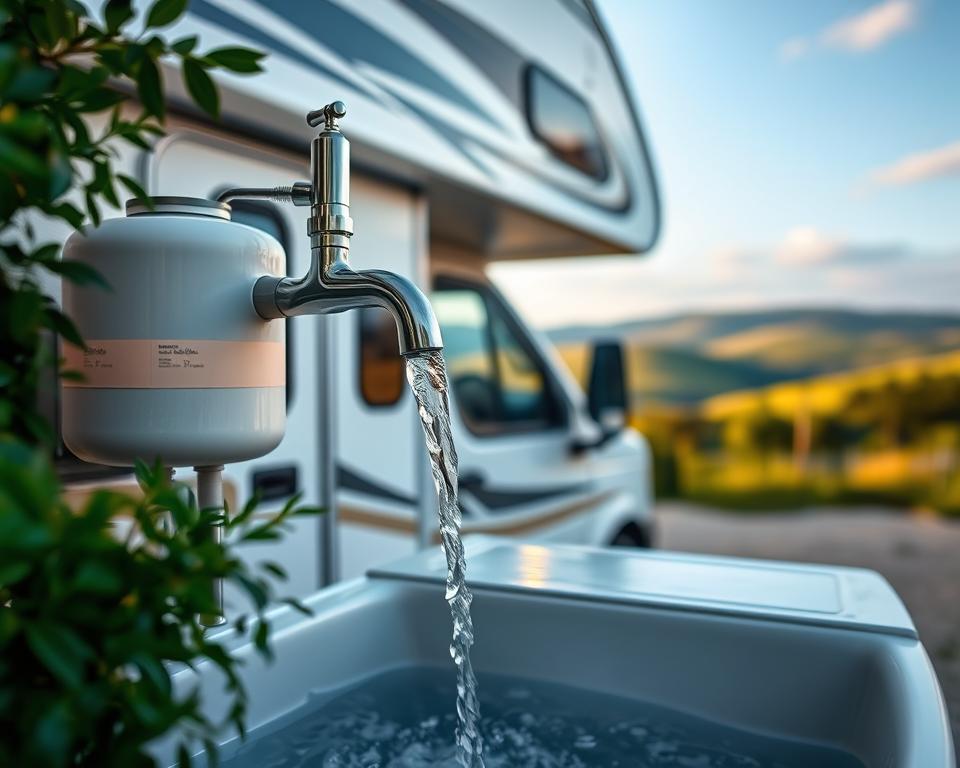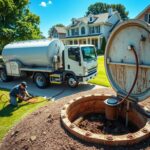RV Sewer Pump Guide: Crucial Care Guidelines
Have you ever thought about the mechanics of your RV’s sewer system? Knowing the intricacies of your RV waste pump can avert mishaps, enriching your camping excursions. It’s centered on controlling waste effectively and avoiding unpleasant aromas. With this manual, you’ll discover critical maintenance techniques for pump for RV holding tank. Each created to sustain your waste disposal system’s ideal functionality.
Grasping Your Camper Waste Pump Configuration
The recreational vehicle waste pump network is vital for waste management, making camping more pleasant. It features two primary tanks: the black water tank for solid waste and the sink/shower runoff tank for water from wash stations. Telling apart these tanks is crucial to avoid clogs and keep your RV functioning efficiently.
An RV waste grinder is a favored option for waste management. It grinds solid waste into fine pieces, facilitating disposal. In contrast, a classic RV pump is available. It efficiently moves waste without shredding, for those choosing a simpler option.
Understanding your RV’s sewage pumping system is crucial to stopping problems and ensuring clean inspections. Managing the system effectively can prevent messes, enhancing your outdoor adventures.
Value of Regular Service
Upkeeping your RV waste pump is vital for a smooth travel experience. Without proper maintenance, you may experience odors, clogs, or backups. These issues can ruin your road trips.
Scheduled upkeep thwart such issues and sustain your system’s life. By checking hoses and seals, you maximize efficiency. A duly maintained RV sewage pump provides smooth waste disposal, letting you enjoy seamless excursions.
Consistent attention also leads to financial savings over time. Oversight can cause expensive failures, requiring expensive replacements. Investing in regular maintenance keeps your motorhome in top condition, saving money long term.
Recommended Frequency for RV Septic Tank Pumping
Determining the proper interval to service your RV Septic Tank is vital for its upkeep. It’s best practice to pump every 3–5 days during use. For short trips, after-journey servicing may work fine.
Frequency depends on multiple considerations. Tank size and frequency of use are important. Ideally pump when it reaches two-thirds full. This helps support steady waste movement and avoid clogs.
Tracking your RV Septic tank levels is essential for a stress-free outing. Oversee properly your camper’s waste to stop issues while traveling.

Best Practices for Emptying Your Tanks
Accurately discharging RV tanks is key for your motorhome’s cleanliness and operation. Start with the black tank to let the grey tank liquid rinse leftover solids. This method prevents clogs and ensures efficient drainage.
Choose a top-grade sewer hose for disposal. A robust hose stops leaks and ensures connections. Include a tank rinser for a thorough rinse, using water pressure to remove remaining debris, boosting cleanliness.
Thorough draining prevents residue buildup, avoiding foul odors and potential issues. To maintain an optimal sewage system in your motorhome, observe these guidelines:
- Regularly use a tank treatment to manage smells and break down waste.
- Watch capacity to avoid leaks.
- Inspect your RV waste pump regularly for clogs and wear.
- Flush your tanks thoroughly monthly or bi-monthly, even during infrequent outings.
Adopting these techniques enhances your sewage system’s resilience and performance, ensuring enjoyable travels.
Stopping Stench and Obstructions
For a pleasant camping experience, preventing foul aromas is key. Keep enough water in tanks to aid in decomposition, warding off unpleasant odors. Also, opting for RV-approved tissue helps prevent clogs, ensuring uninterrupted operation.
For improved waste handling in campers, try enzyme-based tank treatments. These digest residues efficiently, streamlining care. Ensure vent pipe clearance to keep air moving freely in the plumbing system.
Careful waste habits is vital to avoiding tank issues. Avoid flushing wipes, feminine products, and paper towels. These non-degradable objects can cause significant obstructions. Following these tips helps maintain a neater camping environment.
RV Waste Pump Service Tips
Caring for your camper’s waste pump setup is crucial for seamless adventures. Check valve seal integrity often to avoid drips. Leaky seals can cause unwanted leaks, harming your RV.
To banish smells and maintain cleanliness, sanitizing is key. Do thorough sanitation regularly to prevent buildup, ensuring the system performs reliably. These steps are necessary for maintaining a mobile macerator, promoting longevity and smooth service.
Oiling valve mechanisms is another essential task. It helps stop leaks and enhance functionality. Checking sensor accuracy is essential for exact data, preventing backups and unexpected pump issues. Regularly reviewing these points makes your RV adventures spotless and more enjoyable.
When to Call in a Pro for Pump-Out
Spotting sewage issues early can protect you from costly repairs. A tell-tale indicator you need a expert emptying is slow draining. When sinks and toilets take longer to clear, it often points to backups. It suggests your system may be backed up.
Persistent odors are another distinct indicator of sewage troubles. Stench that won’t go away despite cleaning suggest trapped waste. It’s crucial to inspect the clear elbow attachment when dumping waste. Remaining waste visibility signals it’s time for pro maintenance.
Technicians employ water-jet systems to blast through tough clogs efficiently. Neglecting these signs can escalate into major problems. Therefore, it’s critical to seek help immediately when issues arise.
| Signs of Sewage Issues | Recommended Response |
|---|---|
| Sluggish Emptying | Look for blockages; schedule pro maintenance |
| Lingering Smells | Examine system; book professional RV pump-out |
| Remaining Sludge | Contact pump service for thorough cleaning |
Choosing the Right RV Macerator Pump
When picking an RV macerator pump, consider its volume handling, durability, and compatibility with your RV’s size. A high-quality macerator is key for smooth sludge processing. This is especially crucial for RVs requiring frequent disposals. High-end pumps improve sewage handling, ensuring a smoother RV lifestyle.
A range of options cater to specific demands. For an educated choice, focus on these essential considerations:
- Capacity: Verify capacity matches your usage.
- Durability: Opt for models built to endure travel demands.
- Ease of Use: Choose devices that simplify installation and operation.
- Compatibility: Ensure it integrates with your system.
Taking time to compare when choosing an RV macerator pump optimizes travel enjoyment and ensures efficient pump performance.
RV Sewer Pump Troubleshooting
Accurate diagnosis for your RV sewer pump is key in resolving common sewage issues before they worsen. If you notice sluggish emptying, unplanned backflows, or persistent odors, take immediate action. These are definite clues of malfunction requiring attention.
Begin by examining the pump, its connections, and hoses. Look for any clogs that could slow flow. Ensure inlet and outlet fittings are leak-free. Also, verify the pump’s power supply for reliable current.
If basic checks fail to reveal the issue, note the pump’s sound. A unit that’s too loud or unusually silent may have internal damage. Also, check for leaks, as these can compound sewage problems. With these troubleshooting steps, many RV owners can find and fix issues early, avoiding costly repairs.
Long-Term RV Sewer Pump Care
For continued reliability, dedicate yourself to regular sewer pump upkeep. Sanitize the system consistently to prevent clogs. Implement and follow a maintenance routine, keeping everyone informed of their roles. This markedly boosts your waste system’s lifespan.
Educating yourself and others on correct flushing habits is vital. This avertss issues and fosters shared responsibility. The result benefits both users and the sewer system.
- Inspect plumbing and hoses periodically
- Flush and clean filters often
- Book expert service once a year
- Apply recommended conditioners
Following these guidelines prolongs your camper’s sewage system’s durability and keeps it functional, making travels more pleasant.
In Closing
Caring for your RV sewer system diligently is crucial for uninterrupted camping adventures. Regular attention to RV sewer system maintenance markedly cuts problem risks, letting you immerse in the journey. By knowing your system and using reliable sewage methods, your trips will be free of waste management woes.
Applying the key tips from this guide enhances RV waste management and uplifts your travel comfort and safety. Ensure pump reliability by following best upkeep practices and tackling potential issues promptly.
Being watchful and well-informed about your RV sewer system brings dividends. It provides homely comforts while exploring. Wishing you joyous and carefree journeys!
FAQ
How can I tell it’s time to empty my RV Septic tank?
Empty your RV Septic tank once it’s two-thirds full.
Black tank vs. grey tank: what’s the difference?
Black tank is for sewage waste. On the other hand, the grey tank collects water from sinks and showers.
What is the recommended maintenance schedule for RV sewer pumps?
Inspect and sanitize system about every three months.
Which products are best for RV sewer pump care?
Choose RV-approved enzyme formulas and quality hoses and rinsers.
What prevents blockages in RV plumbing?
Use only RV-safe toilet paper.
What signs indicate I need professional RV pump-out?
Watch for slow drainage, recurring odors, or visible residue in the elbow.
How can I improve my RV macerator pump’s efficiency?
Select a correctly sized pump for your RV.
What should I check during a deep clean of my RV sewer system?
Inspect all connections and hoses.
Maintaining my RV sewer system over time?
Train users on proper disposal.
Septic pumping frequency for heavy RV use?
Schedule pump-outs every 3–5 days.

